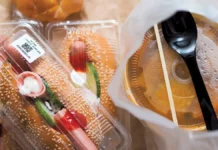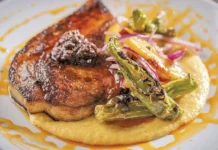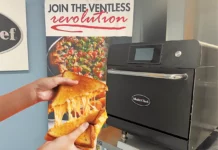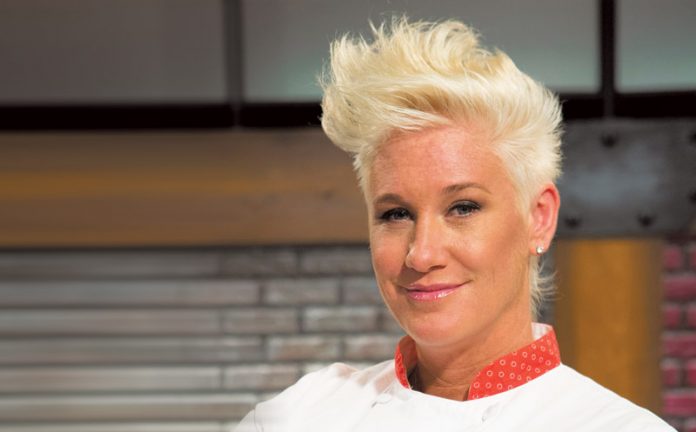
Chef and TV Personality
Ohio Native Anne Burrell worked at several of New York City’s top restaurants before becoming a television sensation. She worked for and battled with Mario Batali on Food Network’s Iron Chef America.
Burrell then went on to host a trio of shows on the fledgling network: Secrets of a Restaurant Chef, Chef Wanted and most recently Worst Cooks In America. Her profile in New York City has grown dramatically as she is a headliner at this month’s Taste of The Upper West Side.
In addition as she tells TFS in this interview, Burrell has inked a pact to open a new eatery in Brooklyn.
What was eating like at home growing up? How do you think it has changed today?
Candy and sugar cereals were not allowed in our house growing up. My mom said, we are going to have a garden and you are going to go out and help in the garden. I was super excited about it. I was part of 4H growing up – going out apple picking and learning how to make apple pies and stuff like that. My mom is crazy about cooking. My apple happily does not fall far from her tree.
How did you get started in the industry?
I went to college at 17 from a little teeny tiny town in upstate New York. It’s kind of what you’re supposed to do. And I ended up majoring in English and communications, which I guess was sort of fortuitous. Something must have sunk in along the way!
Can you share your career path?
I went to the Culinary Institute of America (CIA). I was ready to be a student; I was ready to be a sponge. I really couldn’t learn enough, know enough. It’s an entire culture of people who are talking about food. Then I went to Italy.
What did you take away from the CIA?
How strong your foundation is definitely supports the kind of house you build on that. And once you have a foundation it doesn’t matter what style of house you build. And so mine just happened to be really rustic Italian and I went to Italy thinking I knew what Italian food was and I came back, with my eyes wide open, of course, and loving the Italian kitchen even more than I ever thought I could.
What are the differences between Italian cooking and New York cooking?
Luckily I’m passionate about keeping up with new things. Once I started working in New York, I felt like I picked up my education where it had left off in Italy. You talk to many restaurateurs, you see many people who cook at many different levels, and you find out the successful characteristics that make a restaurant click, especially in New York.
You’ve worked with Mario Batali. What was that like?
Mario and Joe Bastianich are the ultimate restaurateurs. They are tastemakers, they are groundbreakers. They’re wildly smart and a lot of fun to be around. I feel lucky every day to have been able to have that opportunity with Lidia Bastianich and Mario. Look at the empire that they’ve built and look at the disciples that they have, people like us. I was Mario’s sous chef in over 20 Iron Chef America battles. 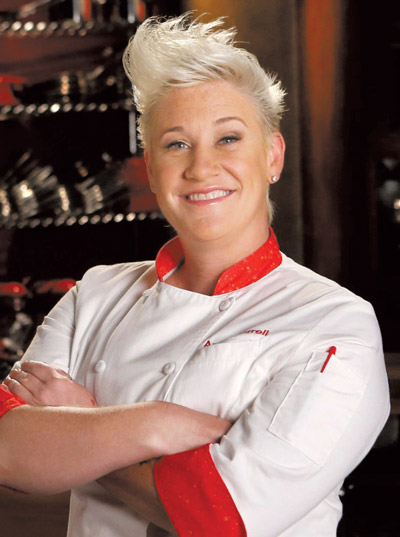
What comes to mind most when you’re thinking about your time with Mario?
Mario is freakishly smart. It makes me crazy. He can sit down and speak with anybody about any subject or topic in depth and tell you about the movies he’s seen, the books he’s read, he’ll talk about cooking, politics, religion, current events. I learned so much from them. I would not be where I am today without either one of them. It was a great rite of passage to have those people in my corner. They started out with great passion and they have stuck to their guns and roots and reinvented themselves and it only keeps getting stronger.
Now that you’re a multimedia personality, do you miss being in a kitchen on a day-to-day basis and running a restaurant?
Yes and no. There are things about being in a restaurant that are amazing. There are other things, however, about being in a restaurant that are just a daily grind. I’m lucky that my schedule is a little crazy and all over the place so I am always doing something different or going somewhere else and I love that.
Are you surprised by the impact that TV has had on the industry? And as you travel the country, has it raised the bar in terms of what people are serving, or lowered the bar?
I feel like it does both. I get surprised at how enraged and passionate people get about it. When I was a little girl, I watched Julia Child, and in my mom’s words, I became a chef because I watched Julia when I was little.
What do you think people respond to most about Worst Cooks In
America?
The first season, when we started, people were like, ‘Worst Cooks in America, what the heck kind of show is that? It’s a terrible name.’ And then the recognition of it grew and people were like ‘Oh my God, are the people really that bad?’ You start off laughing at them and then you see these sort of lovable losers turn around, dig deep and really transform themselves into, I wouldn’t say a chef, but a very decent home cook. And they do it themselves. And it’s all through hard work because the boot camp is an intense place, and if they don’t really buckle down and learn the information, they’re not going to be there long.
You actually left the day to day of working in a kitchen to teach at ICE-Institute of Culinary Education. What did you take from that experience?
I took a job teaching because I was really burnt out from restaurants. I needed a change of scenery, but something still involved with cooking and it definitely made me a better cook. It really made me question cooking techniques and ask myself a lot of “Why do I do this…” sort of thing. I was able to answer these kinds of questions for myself. It made me decide what kind of cook I wanted to be.
What role does writing play in the “Burrell Brand”?
I like to instruct people in my writing. I take it very personally how I write recipes because I really want people to be successful at them. I’m very detailed about how I do it but I also want people to hear my voice. I want it to be, when you’re reading a recipe, you feel like I’m there cooking with you.
Could you tell us just a little bit about your new cookbook, Own Your Kitchen?
Well my first book Cook Like a Rock Star was my history of becoming a girl chef, and this is my journey as a girl chef. So, you know, the other one really starts off with super basic cooking techniques and this starts off at the beginning. It’s written through my eyes, through my travels and through dishes that I really like to make and eat. It’s written in a very approachable way. Whether you’re an advanced cook or a novice cook, you can still be successful at the recipes.
What I also love about it is that the ingredients for the recipes are what I call “grocery store ingredients”. It’s not crazy stuff that you have to search all over the place to find. You can go for the most part to find all of the ingredients at your local grocery store. Or, you know, some substitute thereof which would be included in the recipe. They are written in a way that everyone can follow. It doesn’t treat anyone like they are stupid, and it’s kind of fun; you feel like my voice is there cooking with you.
Do you think being a woman chef in the culinary industry is different than being a male chef?
The conversation seems to be everywhere recently.
I don’t know why it’s all of a sudden such a hot topic. There have never been very many women in the kitchen. There are probably more now than there ever have been before, so why are we noticing that for the first time? I don’t get it. People ask me what it’s like to be a girl chef and I’m always like, ‘I don’t know. What it’s like to be a boy chef?’ It feels pretty normal to me. There aren’t more woman chefs recognized because there are just less of them. I think if you look at it – the percentage of woman chefs that are recognized versus the percentage of man chefs that are recognized – they’re probably fairly even-ish. Maybe girls even have a little bit of the upper hand.
Why do you think fewer women get into the industry then men?
It’s a really hard life. It’s physically hard, it doesn’t pay well, it’s really long hours – it’s nights, it’s weekends. A lot of times women have to decide: Do I want to have a restaurant career, or do I want to have a relationship and a family? That’s a big decision.
As you look back on the Iron chef experience, what was the take away?
It was one and done for me. It was too emotional. I was on that show from the very first episode, from the pilot as one of Mario Batali’s sous chefs. It was our same team – Mario, Mark Ladner and myself. I always felt very lucky to be a part of that team. When I competed on the show, it was something that was very near and dear to my heart. And then I went on Next Iron Chef, and I felt like what happened on that show isn’t exactly what normally happens in Kitchen Stadium. I was hugely disappointed in myself. I should have been a shoe-in for that; that I didn’t make it even close was a huge personal disappointment.
If you could turn back the Iron Chef clock, who would you like to compete against?
For the rematch, Geoffrey Zakarian. That’s who I went home from Next Iron Chef against. He’s a great friend and a great guy, but I would go up against him anytime.
What’s your advice to young chefs that are just getting into the business?
Work hard. Leave your cell phone in your locker. Learn as much as you can. Show up early and stay late. And love what you do, because it’s way too hard of a business to be in if you don’t really buckle down and learn the information; they’re not going to be there long.
What have you learned from all your experiences in the industry?
You really need to figure out how to reinvent yourself, how to go with the flow, how to accept having what you think is an amazing idea that’s just not accepted by the public the way you would like it to be, and have to scrap it. You’re only as good as what people are going to pay for. And to really be just the very best, use the very best products that you possibly can. Not every restaurant is a five-star restaurant but get the best ingredients that you can afford and respect and work with them to make the very best meals you can.
What’s next for you?
I’ve got a couple of seasons of “Worst Cooks” episodes that I’m filming, and a restaurant in the works in New York. I am working with Phillip Casaceli, the owner of West Village bar Daddy-O. We have a location, 96 Smith St. in Brooklyn. After several years of focusing on a very busy television career I’m thrilled to make the leap back into the restaurant world, a passion that has never left.
Photos by Food Network


















